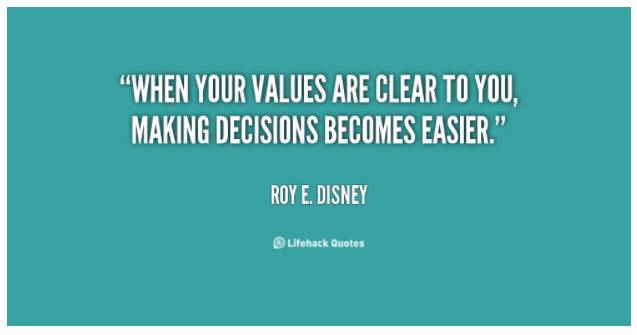How much do your values play into your life? While there are some people who live out their values every day, there are just as many who don’t even know what their values are, let alone how they affect their decisions. One of the things I often find with my clients is that they want their financial planning to achieve certain goals but that those goals are not well-defined because they aren’t based on a value system. It’s vitally important for every person—whether they are planning for retirement yet or not—to identify their values and incorporate them into their daily lives. Here’s how you can identify your values, then use them to greatly increase the fulfillment you will get when you achieve your financial goals.
Values Evaluation
If you don’t have a good idea of what you value in life, you might find it overwhelming to figure your value system out—especially if you’re older and have never given this much thought. Many people simply live out the values their parents displayed—whether this means going to church every Sunday or voting Republican in each election—without really understanding if they personally still believe in these things. If you are trying to determine what you really value, you can do so by taking a look at two areas:
Where you spend your money Go through your bank records and note where you spend the most money. Do you find that a large part of your budget goes toward improving your home, ingredients to cook meals, and buying sports equipment for your kids? If so, family is probably one of your core values. Do you spend on vacations, dinners out, and road trips? Then freedom is probably high on your list.
Where you spend your time Do some time tracking over the next few weeks and determine where you spend the majority of your time. Do you burn the candle at both ends at the office? If so, building wealth and a legacy is probably high on your list. Do you spend almost every free moment on improving your wellness through eating right, going to the gym, or meditating? Then health and wellness are very important to you.
Once you have a list of values, you can determine how much they are currently playing into your life and decisions. Not only will this give you some deeper insight into your life, but it will also help you make some course corrections if you realize you are living out someone else’s values or are not living a life that reinforces your ideals.
Social Investments
So how does the affect your investments? Many of my clients want to partake in what is called ‘social investing’. This means they want their investments to align with their values. For example, if one of their values is personal freedom, they may not want to invest in any company that is pro-gun control.
It’s important that you convey your social investment preferences to your advisor so they can help you make the appropriate financial decisions. A few of the ways an advisor can do this is by seeking out investments with companies that align with your values, bundling together mutual funds or other investments into ‘baskets’, or making a point to avoid investing in companies that conflict with your values. However, I always warn my clients who want to socially invest that they will likely have to make sacrifices when it comes to return on investment as some of the most profitable companies to invest in may not align with their values.
Action Steps
Ready to start defining your core values and incorporating them into your daily life, finances, and overall life vision? Here are the three action steps you need to take:
Evaluate Take some time to look at your spending, how you spend your free time, and what matters the most to you. Don’t rush this process—you really need to feel your way through it. Once you have a list of values, you can rank them by putting them up against each other. For example, if two of your values are ‘family’ and ‘wealth accumulation’, you can rank which is more important. You can then rank that value against another until you come up with a hierarchy with the most important value on the top.
Share Sharing your values with your spouse or significant other is crucial so you can better understand and support them—and so they can do the same for you. Not understanding where a spouse is coming from and judging their actions from this place is one of the best ways to head for a late-life divorce. Sit down and go over your goals and really talk about them. Make sure you do this in a kind and understanding way and with the knowledge that you don’t have to agree on everything. You are two individuals who were raised in different ways and it’s highly unlikely you’ll have the exact same values.
Look at how your values should affect different financial areas of your lives Now that both you and your spouse are aware of your values, you can start looking at how they can be incorporated into different financial planning areas. How will this affect your retirement? Paying for your kids’ education? Taking care of aging parents? These are good conversations to have with your financial planner as well so you can all be on the same page.
Your values should be at the very center of your life and everything you think, say, and do should revolve around them. If you’ve not yet identified your values, now is the time to do so. Not only will it help your financial advisor help you properly plan for the future, but it will also greatly improve your chances of living a happy, fulfilled life. Want to further discuss how your values coincide with your investment strategy? Please reach out so we can talk.
 Patrick Tucker, the owner of True Measure Wealth Management, has over 20 years experience in the industry and has spent the last 15 years learning the ins and outs of the fee-only advisory business. He focuses on client behaviors and what ‘wealth’ means for each individual client to provide caregiving plans that lead to a mindful fulfillment of financial goals. A lifelong learner, Patrick uses his continued knowledge to become a valued partner for his clients and help them explore the wisdom of true wealth.
Patrick Tucker, the owner of True Measure Wealth Management, has over 20 years experience in the industry and has spent the last 15 years learning the ins and outs of the fee-only advisory business. He focuses on client behaviors and what ‘wealth’ means for each individual client to provide caregiving plans that lead to a mindful fulfillment of financial goals. A lifelong learner, Patrick uses his continued knowledge to become a valued partner for his clients and help them explore the wisdom of true wealth.

